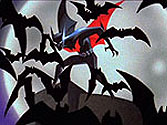 |
 Zeta
Zeta
A
killer synthoid is loose in Gotham.
Original Airdate: April
8, 2000
Episode # 28
Rating: * *
|
||
|
|
|
| Credits | Cast | |
Written by Robert Goodman Directed by Dan Riba Music by Michael McCuistion Animation by Koko/Dong Yang |
Will Friedle as Terry McGinnis Cree Summer as Max Gibson Stockard Channing as Barbara Gordon Lauren Tom as Dana Tan Gary Cole as Zeta |
Gregg Berger as Dispatch Agent Jeff Harlan as Agent Console Kerrigan Mahan as Baker Edie McClurg as Ms. Martel Joe Spano as Bennett |
|
|
|
Of course, it's obvious why these guys can never reform: because then we wouldn't have such cool villains to follow around any more. Stasis and repetition are the dangers courted when nothing changes, but the Batman mythos has done well with an implicit justification. The world it posits is a fallen one; its inhabitants are always blighted; there is no hope for them anyway. The lack of change and development, then, seems to flow from a philosophical attitude (though a profoundly pessimistic one) rather than from the crassly mercenary desire to milk the franchise from now until the Second Coming. What an ironic rebuke it is, then, that although man can never himself escape, one of his creations might. Zeta, a synthoid programmed in the arts of imitation, treachery and murder, transcends its limits and comes to possess greater originality, fidelity to principle, and respect for life, than those who built it. Is Bennett, the government agent chasing Zeta, humiliated by the freedom shown by his creation? Is he just blind to the possibility that, though he is enslaved by his training and mission, others might be free? Or is he merely the unwitting pawn of a malignant universe, intent on catching and destroying a rogue piece on its chessboard of misery? Heady possibilities, but mostly unrealized, it must be said. But then, Mary Shelley's Frankenstein takes hundreds of pages to tell the story of the creation, growing consciousness, and ultimate rebellion of a synthetic creature; "Zeta" tries the same thing in twenty minutes. Guess which one better succeeds. No, I'm not recommending Shelley's turgid tome over the zippy "Zeta." But charity requires we recognize just how steep a hill this story tries to climb. Since the focus, philosophically and dramatically, has to be on this synthoid, we want to witness every choice it makes; every opportunity for development and change; every twinge, every mistake, every epiphany. And since Zeta is an artificial creature, it must doubly justify itself. Not only must it show us it can escape the curse of the Batman universe, it must convince us it is a conscious, thinking thing, for how else will it be able to overcome its programmed impulses? Such moral and narrative complexities cannot be compressed into twenty minutes, so we only get the climax of Zeta's story without any of the set-up. That is why "Zeta" (though not Zeta) dissatisfies. Still, there is good stuff here. Robert Goodman writes scripts of subtlety and grace (witness the extraordinary teleplay he supplied for TNBA's "Growing Pains") and he squeezes out some nice effects here. The opening biology lecture (have we free will, or are we foredoomed by our DNA?) is a canny anticipation of the episode's theme, and an accident at the hands of some snowbunnies and their skis shows wit. Goodman attempts to supply what is missing (Zeta's decision to forswear its programming) with a reminiscence about a child and her bicycle that is affecting, though too obviously calculated to cover a gap. Above all, his story shows vaulting ambition, and if it remains a Prometheus bound to a rock, I won't supply the vulture. "Zeta"
represents a missed opportunity, promising a unique thing in Batman:
an antagonist not doomed to be an antagonist. Its story, if spread out
over several independent episodes, could have given us the growing education
of this remarkable creature, and the education of Batman as he came to
appreciate its sophistication and ambiguous existence. Would there have
been any suspense greater, any tension less extreme, than watching to
see if Zeta would ultimately choose good over evil and freedom over fate?
Or in seeing if Batman could overcome his own innate suspicions and trepidations,
and resist his own (programmed) urge to persecute it back into old patterns? POSTSCRIPT: This episode led to the introduction of The Zeta Project, set in the same universe and time frame as Batman Beyond. In that series' "Shadows" Batman had a glorified cameo appearance; fans of The Simpsons were reminded of the "Chief Wiggum, P.I." and "The Love-matic Grandpa" segments of "The Simpsons Spin-off Showcase," but not in a good way. |
|
|
|
|
Related
Episodes |
What
Others Are Saying ... |
|
|
| Back
to The Winning Edge |
Forward
to
Batman: The Animated Series |